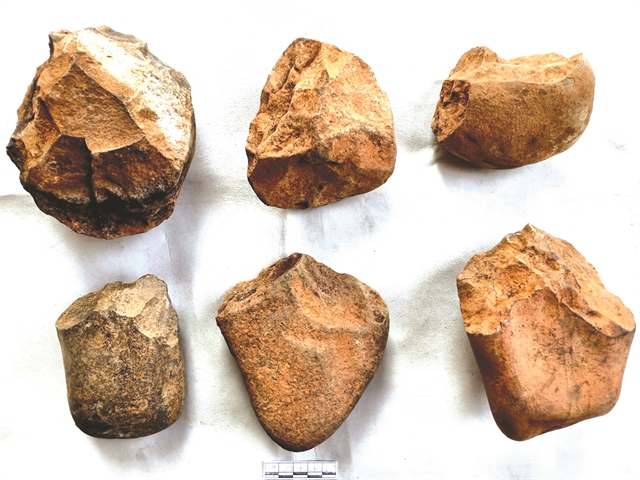 Life & Style
Life & Style

BẮC KẠN — Traces of early humans dating back 20,000 years have been found in caves in karst mountains around Ba Bể Lake in the northern province of Bắc Kạn.

|
| Inside Thẳm Kít Cave. — Photo courtesy of Trình Năng Chung |
According to researcher Trình Năng Chung, head of an excavation delegation, the caves are located in the core area of Ba Bể National Park. Most traces were found in Thẳm Kít Cave, which is 50m above the lake surface. The cave faces southwest while its inside measures nearly 3,000sq.m. Its floor is fairly smooth and divided into three large rooms with many small corners.
There are many big stones inside the cave, which are believed to have fallen from the cave’s roof during big geological changes in the past.
Most of the cave area receives natural light, which may have helped early humans live there.
Excavators have found many carved tools from stones.
Scientists found traces of early humans all over the cave. They found the only layer of culture of 50cm thick formed by clay inside the cave containing ancient objects, bones and teeth of animals. Besides more than 50 stone objects, scientists also found traces of an oven.
The bones and teeth of animals found in the semi-fossilised form are believed to be remains of food left by early humans.

|
| Stone objects found inside the cave. — Photo courtesy of Trình Năng Chung |
“We found a small flat pebble bar with two holes of some 1.2cm in diameter on the surface,” Chung told Việt Nam News. “The object seemed to have been carefully carved and cut. We still don’t know what it was used for.”
Traces of semi-fossilised bones, teeth and stone objects showed that hunting and picking vegetables and fruits were fairly important in how early human sought food, he said.
It seems stone working tools were cut and carved in the cave, he said.
Chung confirmed that based on a general examination of objects, traces and sedimentary soil, scientists believe Thẳm Kít Cave was a residential area of early humans in the late period of the old Stone Age, some 20,000 years ago.
Excavators have also found nearly 100 valuable objects including stone objects of Hòa Bình Civilisation (12,000-10,000 BC) in nearby Thẳm Myà Cave and many ceramic objects of the Metal Age in Nả Phoòng and Ba Cửa caves.
Chung said they will further examine Thẳm Kít Cave. — VNS




